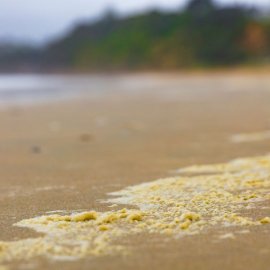Pharma Pollution
-
English
-
ListenPause
[intro music] Welcome to World Ocean Radio… I’m Peter Neill, Director of the World Ocean Observatory. The growth of the pharmaceutical industry has been a story of great invention, derived from the study of chemistry and biology, informed by Nature, and an undeniable contribution to general health, the quality and longevity of life, and the progress of human civilization. We acknowledge that history and its iterations of treatment, its growing catalogue of antibiotics, vaccines, and other examples of curative invention. There is much discussion about a distinction between natural treatments and modern drugs, as if there is an amoral difference, even if there is an ultimate moral outcome. That seems a philosophical nuance as even the most modern pharmaceuticals are derived from natural origins and/or invented processes derived from Nature. Beyond the cures, the public health successes, and demographic implications, there remains the underlying problem of external consequential negatives of such progress: addiction, social disruption, and pollution, negatives contradictory to positive intent. What has become apparent is that pharmaceutical residue has begun to find its way from manufacture and use to disposal and entry into our waste and circulation systems as medical contamination. A study by researchers at the Global Monitoring of Pharmaceuticals, organized by the University of York, as described in a February 2022 article in ECO Magazine, examined 258 rivers around the world, including the Amazon, Mississippi, Thames, and Mekong, to find: “pharmaceutical pollution contaminating water on every continent; strong correlation between socio-economic status of countries studied, with lower middle income nations the most polluted; high levels most positively associated with regions of high median ages as well as high local unemployment and poverty rates; most polluted regions being the ones researched the least, namely sub-Saharan Africa, South America, and parts of southern Asia; and the primary cause of such pollution being rubbish dumped along river banks, inadequate wastewater infrastructure, pharmaceutical manufacturing waste, and residual contents of sewage and septic tank outfall in rivers.” “Water samples were obtained from sites spanning a Yanomami village in Venezuela where modern medicines are not used, to some of the most populous cities on the planet, such as Delhi, London, New York, Las Vegas, and Guangzhou. Areas of political instability such as Baghdad, the Palestinian West Bank, and Yaoundé in Cameroon were also included. The climates where samples were obtained varied from high alpine tundra in Colorado and polar regions in Antarctica to Tunisian desserts.” This pharmaceutical pollution is as important and critical a factor for public health as plastic and other manifestations of chemical waste which have received much more scientific research, press coverage, and public response where the fact of persistent organic pollutants, mercury and other industrial toxins, and the presence of plastic microbeads in the ocean is better known. This study adds both depth and extent to the problem, a documentation of the pervasive presence of some many heretofore unrecognized pollutants in our streams and rivers, sewers and treatment plants deposited into the ocean, into coastal sediments and living marine biota, and further into a global system of distribution down the water column, downstream, and into our bodies with implicit, inherent, insidious effect. The irony is almost incomprehensible. We know science, we use science, we apply science, we exploit science for its pharmaceutical value as cure, yet we neglect the last part of the cycle, the by-product that is invisible and microscopic, outside and inside our apparent world, known but unacknowledged, still to be explored and understood, along a scale of value from miracle cure, celebrated and rewarded, to deadly poison, hidden, powerful, and enduring. The sea connects all things, like the serpent eating its tail, in a circle of life and death and life again. We will discuss these issues, and more, in future editions of World Ocean Radio World Ocean Radio is distributed by the Public Radio Exchange and the Pacifica Network, for use by college and community radio stations worldwide. Find us wherever you listen to podcasts, and at world ocean observatory dot org. [outro music]
Pharmaceutical pollution is as important and critical a factor for public health as microplastics and other chemical wastes that enter the water cycle, marine biota, and our bodies. A recent study by researchers at the Global Monitoring of Pharmaceuticals examined 258 rivers around the world and found that pharmaceutical pollution is contaminating water on every continent.
About World Ocean Radio
Peter Neill, Director of the World Ocean Observatory and host of World Ocean Radio, provides coverage of a broad spectrum of ocean issues from science and education to advocacy and exemplary projects. World Ocean Radio, a project of the World Ocean Observatory, is a weekly series of five-minute audio essays available for syndicated use at no cost by college and community radio stations worldwide.
World Ocean Radio is produced in association with WERU-FM in Blue Hill, Maine and is distributed worldwide by the Public Radio Exchange and the Pacifica Network.
Available for podcast download wherever you listen to your favorites.
Image
Photo by Jon Moore on Unsplash
@thejmoore
- Login to post comments



